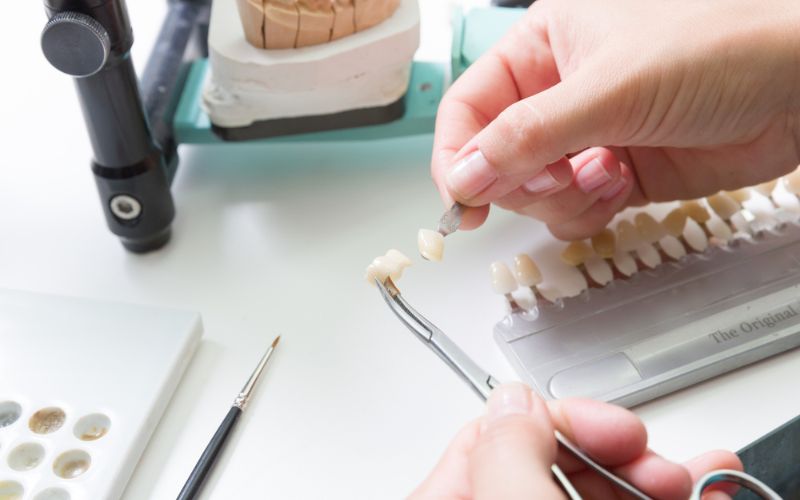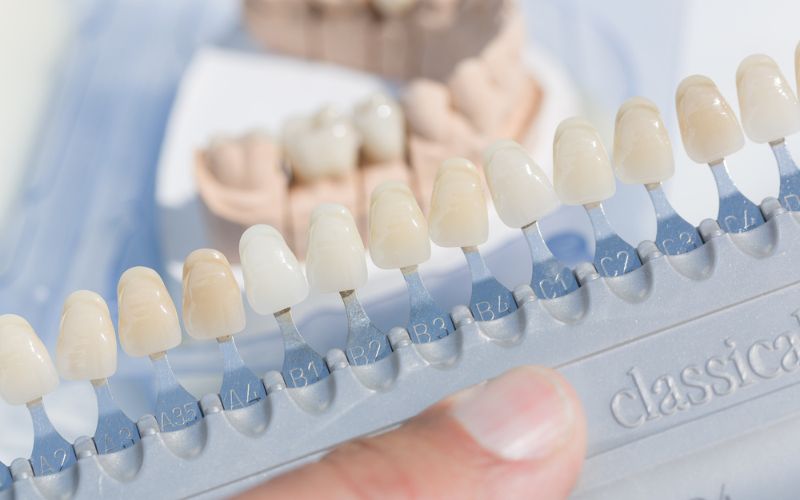Subscribe to our newsletter!
Dental veneers are custom-made shells, remarkably thin yet robust, crafted to cover the front surface of your teeth. They effectively tackle a myriad of dental imperfections, from discolouration to slight misalignments, dramatically enhancing the appearance of your teeth. Veneers work by covering the visible part of your teeth, creating an immediate impact on your smile. Their ability to reflect light similarly to natural teeth gives them an exceptionally lifelike appearance, making them a popular choice for those seeking aesthetic dental improvements.

In the realm of veneers, there are several types of veneers to consider. Porcelain veneers, made from dental porcelain, are celebrated for their strength and their ability to mimic the translucency of natural teeth. Composite resin veneers represent a less expensive alternative, offering a quicker solution for smile enhancements. While porcelain veneers require a layer of porcelain to be bonded to the tooth, composite veneers are less involved, as they can be applied directly and sculpted to the teeth. Other options include no-prep veneers, which require minimal alteration to the natural teeth, and snap-on veneers, a removable option that offers a temporary solution. Understanding the differences between these types of dental veneers is crucial in determining which will best suit your individual needs and aesthetic aspirations.
Choosing between porcelain veneers and other dental alternatives hinges on several factors, including dental health, aesthetic goals, and budget considerations. Porcelain veneers, renowned for their longevity and resistance to staining, are often preferred for a long-lasting dental makeover. In contrast, composite resin veneers, while more budget-friendly and quicker to apply, may not have the same durability as their porcelain counterparts. The cost of porcelain veneers varies, but their long-term benefits often justify the investment. For those considering a less invasive or reversible option, no-prep veneers may be an ideal alternative, as they preserve more of the natural tooth structure. Ultimately, the choice between porcelain or composite resin veneers should be made in consultation with a dental professional, who can advise on the best option based on the individual’s dental condition and cosmetic goals.
The veneer procedure is a meticulous process that typically unfolds over two to three visits. The first step involves the dentist gently removing a thin layer of enamel from the front surface of the teeth, creating space for the veneer. This step is crucial as it ensures the veneers fit perfectly and align with the overall dental structure. Next, an impression of your teeth is taken and sent to a dental laboratory, where dental professionals craft your personalized veneers, whether they are made from porcelain or from resin composite.

During your final visit, the dentist carefully places the veneers to your teeth, ensuring the fit and colour match your natural teeth. The veneers are then cemented in place using dental cement, a process where precision is key. This is when the veneers are permanently bonded to your teeth, a process that is irreversible. The result is a dramatic enhancement of your smile, blending seamlessly with your natural teeth to create a refreshed, rejuvenated appearance.
Veneers are designed for longevity, with porcelain veneers often lasting between 10 to 15 years, and composite veneers approximately 5 to 7 years. The lifespan of veneers can be maximized through diligent dental care, which includes regular brushing with a soft-bristled toothbrush, flossing, and routine dental check-ups. Protecting your veneers from undue stress, such as teeth grinding or chewing hard objects, is also essential to prolong their life.
When you decide to get veneers, the preparation process involves a comprehensive dental assessment. This may include taking dental x-rays and making sure your natural teeth and gums are healthy. Your dentist may use digital imaging technology to give you a preview of what your teeth will look like with veneers. This step is crucial as it ensures that you are a suitable candidate for veneers and helps in creating a treatment plan tailored to your specific needs. The preparation stage is collaborative, allowing you to discuss your expectations and any concerns with your dentist, ensuring the final outcome aligns with your vision for your smile.
Temporary veneers play a pivotal role, especially in the porcelain veneers procedure. These temporary dental veneers are often utilized to safeguard the teeth that have been prepared for veneering. They serve as a protective layer, preventing sensitivity and potential damage while the permanent veneers are being made in the dental laboratory. Additionally, temporary veneers provide a preview of the new smile, allowing adjustments in shape or colour before the final application. This step is crucial for ensuring that the final veneers meet the patient's aesthetic expectations and fit comfortably.
The care of your veneers is paramount to maintaining their appearance and longevity. Regular dental hygiene, including brushing twice a day and flossing daily, is essential. It's important to use a soft-bristled toothbrush and non-abrasive fluoride toothpaste to protect your veneers from unnecessary wear. While porcelain veneers are less prone to staining compared to natural teeth, it’s advisable to minimize the consumption of stain-causing foods and beverages like coffee, red wine, and berries. This proactive approach helps in maintaining the pristine condition of your veneers.

Dental veneers offer more than just an aesthetic upgrade; they also provide functional benefits. By correcting issues like gaps in your teeth or minor misalignments, veneers can improve your bite and overall oral function. Each veneer is custom-made to match the colour and contour of your natural teeth, ensuring a seamless integration into your smile. This bespoke approach not only enhances the visual appeal but also contributes to a more comfortable and functional bite alignment.
Teeth with veneers offer a natural look and feel, closely mirroring the experience of natural teeth. Veneers are designed to blend indistinguishably with your existing teeth, providing a uniform, bright smile. They are also crafted to replicate the feel of natural enamel, ensuring comfort in everyday activities like eating and speaking. With veneers, there is no need for specialized maintenance beyond regular dental care routines, making them a convenient choice for those seeking a durable and attractive dental solution. The added confidence that comes with a rejuvenated smile is an invaluable aspect of life with veneers.
The journey to obtaining dental veneers in Windsor is twofold: it is an opportunity to enhance your smile's beauty while simultaneously upholding the integrity and health of your natural teeth. With proper care and maintenance, veneers can be a lasting testament to the blend of artistry and functionality in modern dentistry. For those ready to take this step, dental veneers in Windsor offer a gateway to a brighter, more confident smile.

Subscribe to our newsletter!